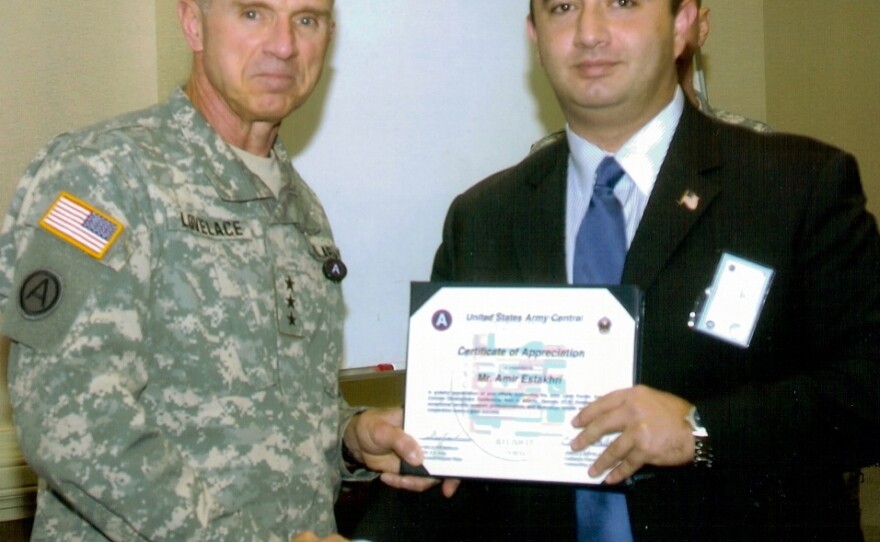Amir Mohammed Estakhri is an American citizen of Iranian descent, and a longtime San Diego resident. He's a native Farsi speaker — the official language of Iran. And he speaks Dari, a very similar language spoken in Afghanistan.
Estakhri is bicultural, well-educated, and he has experience interpreting in the international business arena. After the 9/11 terrorist attacks, his skills were in high demand. In 2005, he began working on contract for the State Department’s Office of Language Services.
“Number one, I've always been interested in politics and the implementation of policies," Estakhri said. "I've always been very attached to following events, so I wanted to contribute and also gain a better understanding."
The Office of Language Services is the federal government’s official source of interpreters and translators — for the president and top members of his cabinet, for the State Department. They’ve been doing it since George Washington was in office.
Working for LS, Estakhri’s career took off.
“Throughout the years I accompanied the highest ranking Afghan military delegations in their visits across the United States to various military installations, to the Pentagon, to policy meetings, also to the State Dept," Estakhri said.
He also worked for top U.S. military leaders and officials in the Bush and Obama administrations, including on one occasion for former Ambassador Ryan Crocker's team in Iraq.
But the work Estakhri did interpreting for Iranian President Mahmoud Ahmadinejad was different. Estakhri has interpreted for the Iranian president during interviews with CNN's Piers Morgan and Christiane Amanpour, and other American journalists.
Estakhri said he was first hired to interpret for Ahmadinejad in 2005 by a company that contracts with CNN. His assigning officer at the State Department referred him for the job, he said.
After that, the Iranian delegation to the United Nations in New York would contact him directly when they needed an interpreter for media interviews.
But these days, Iran is probably the U.S.'s most visible enemy. And Estakhri’s work interpreting for Iranian officials has recently gotten him into trouble.
A reporter for the Wall Street Journal wrote an article about Estakhri in February titled “Iranian-American Interpreter Speaks for Both Sides.”
After it was published, Estakhri got a letter from the State Department saying his services were no longer needed. A spokesperson for the State Department declined to comment for this story.
Estakhri said he never considered that his work for Iranian delegations could be a problem.

“It wasn't really a concern for me, in fact I was happy to contribute in order to be able to open the dialogue," he said, "in order to be able to even minutely contribute to eliminating possible misunderstandings, which unfortunately thus far have proved to be futile.”
Jamal Abdi, policy director of the National Iranian-American Council, said he wasn't surprised Estakhri's work created controversy. NIAC is a D.C.-based group that advocates, among other things, for a diplomatic solution to the U.S.’s standoff with Iran over that country’s nuclear program.
“Any interaction between the U.S. and Iran has almost been criminalized,” Abdi said. “When the reality is the two sides need to be talking, that’s a big part of the problem that there is so much suspicion and there is no interaction between these two governments."
Abdi said he knows others who have interpreted for Iranian delegations to the U.S., and it doesn’t mean they’re sympathetic to that government.
Shamus Sayed, vice president of sales and marketing at the San Diego firm Interpreters Unlimited, pointed out that Estakhri was certified by the State Department’s Office of Language Services, which, according to the office’s own website, “is the ‘gold standard’ for interpreting and translating.”
And professional interpreters follow a code of ethics, Sayed said, which includes things like accuracy, confidentiality and maintaining objectivity.
Estakhri said he was always objective while on the job. But he does have clear opinions about U.S. relations with the Middle East, especially when it comes to the possibility of a U.S. attack on Iran.
“I don’t believe we have the heart left in us for another unprovoked war," Estakhri said. "I think there has been enough American casualties.”
He hopes he’ll be asked back to work with the State Department in the future. In the meantime, he’s planning a documentary about the Iranian people, and a book about everything he’s learned over the years, as he puts it, “talking for other people.”






